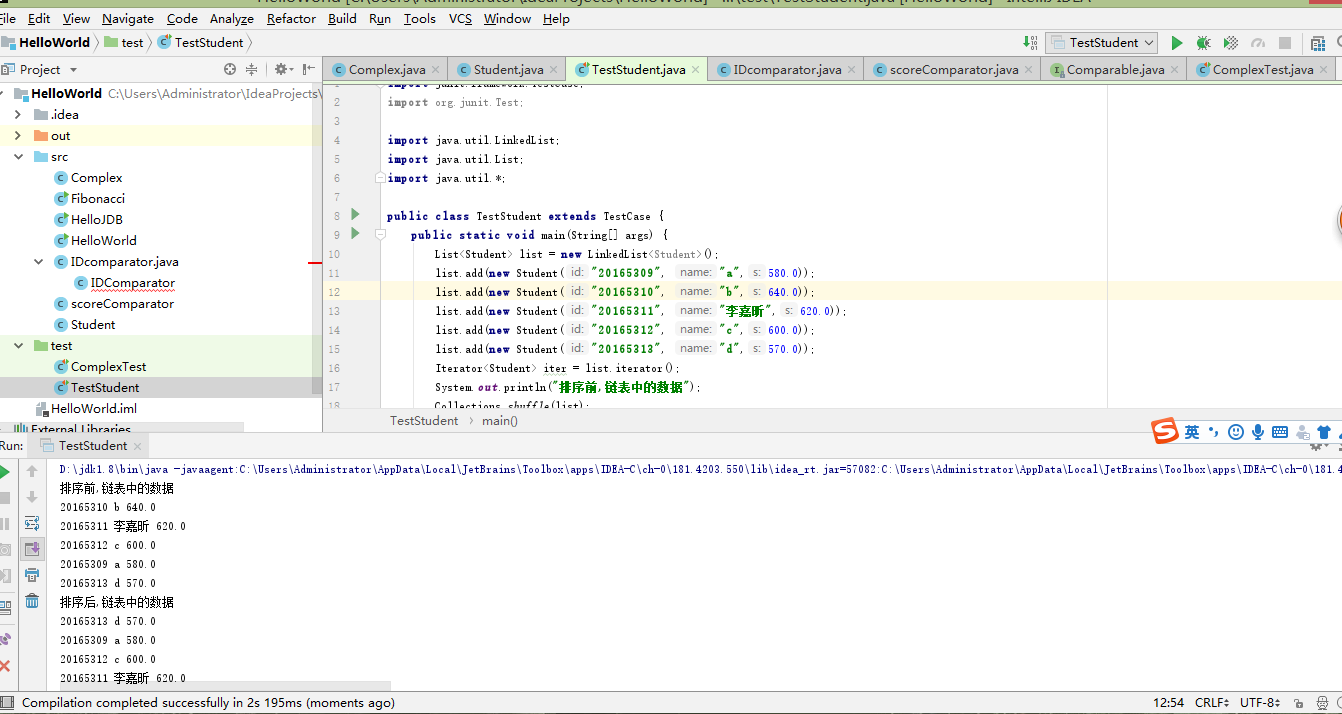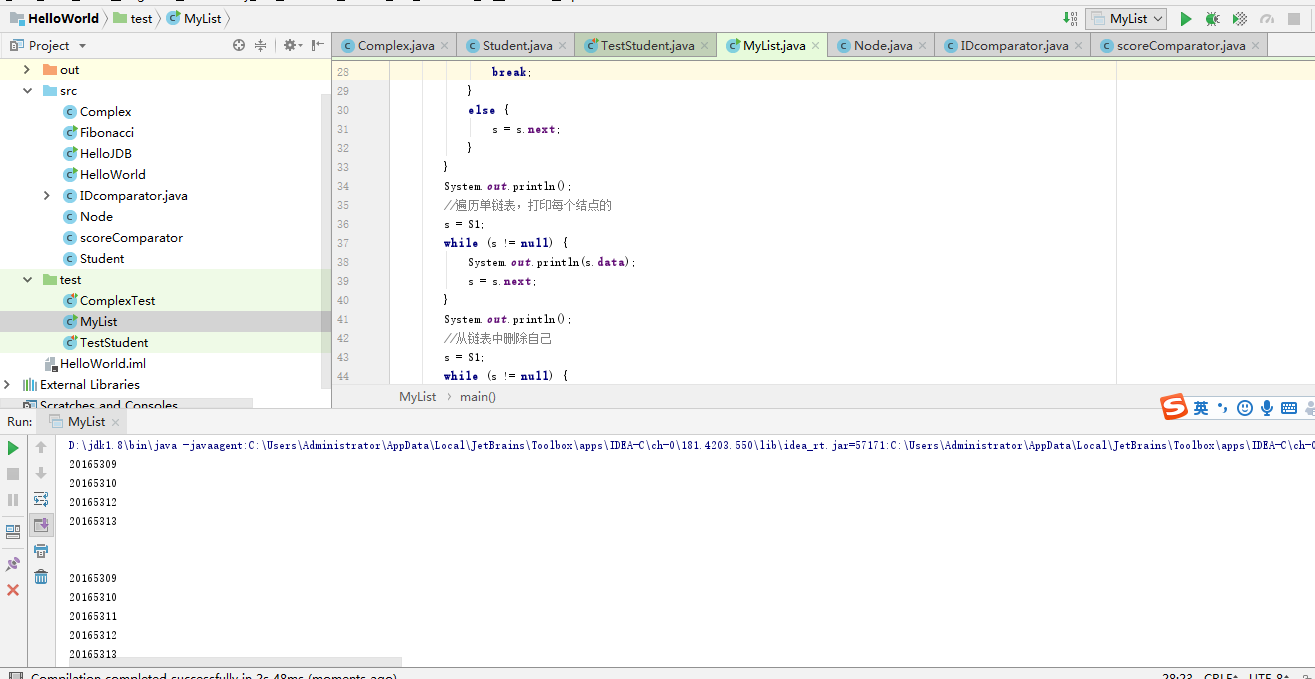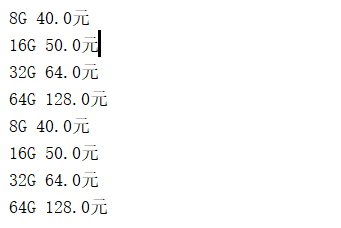第十周查漏补缺
- 排序
- 有类的源代码,针对某一成员变量排序,让类实现
Comparable接口,调用Collection.sort(List)。 - 没有类的源代码,或者多种排序,新建一个类,实现
Comparator接口 调用Collection.sort(List, Compatator)。
- 有类的源代码,针对某一成员变量排序,让类实现
- 泛型类声明:
class 名称<泛型列表> - 创建链表
LinkedList<String> mylist=new LinkedList<String>(); - 向链表增加节点
list.add(E obj); - 从链表中删除节点
list.remove(index) - 升序排序
public static sort(List<E>list) -
折半查找list是否含有和参数key一样的元素
int binarySearch(List<T>,Tkey,compareTo
第二题
import java.util.Comparator; public class Student { private String id;//表示学号 private String name;//表示姓名 private int age;//表示年龄 private char sex;//表示性别 private double computer_score;//表示计算机课程的成绩 private double english_score;//表示英语课的成绩 private double maths_score;//表示数学课的成绩 private double total_score;// 表示总成绩 private double ave_score; //表示平均成绩 public String getName() { return name; } public Student(String id, String name ,double s) { this.id = id; this.name = name; this.total_score = s; } public String getId() { return id; }//获得当前对象的学号, public double getComputer_score() { return computer_score; }//获得当前对象的计算机课程成绩, public double getMaths_score() { return maths_score; }//获得当前对象的数学课程成绩, public double getEnglish_score() { return english_score; }//获得当前对象的英语课程成绩, public void setId(String id) { this.id = id; }// 设置当前对象的id值, public void setComputer_score(double computer_score) { this.computer_score = computer_score; }//设置当前对象的Computer_score值, public void setEnglish_score(double english_score) { this.english_score = english_score; }//设置当前对象的English_score值, public void setMaths_score(double maths_score) { this.maths_score = maths_score; }//设置当前对象的Maths_score值, public double getTotalScore() { return total_score; }// 计算Computer_score, Maths_score 和English_score 三门课的总成绩。 public double getAveScore() { return getTotalScore() / 3; }// 计算Computer_score, Maths_score 和English_score 三门课的平均成绩。 public int compareTo(Object o) { Student st = (Student)o; return (Integer.parseInt(this.id)-Integer.parseInt(st.id)); } }
public class Node<T> //单链表结点类,T指定结点的元素类型 { public T data; //数据域,存储数据元素 public Node<T> next; //地址域,引用后继结点 public Node(T data, Node<T> next) //构造结点,data指定数据元素,next指定后继结点 { this.data = data; //T对象引用赋值 this.next = next; //Node<T>对象引用赋值 } public Node() { this(null, null); } @Override public String toString() //返回结点数据域的描述字符串 { return this.data.toString(); } }
import java.util.Comparator; public class scoreComparator implements Comparator { @Override public int compare(Object o1, Object o2) { Student st1 = (Student)o1; Student st2 = (Student)o2; return (int) (st1.getTotalScore()-st2.getTotalScore()); } }
import junit.framework.TestCase; import org.junit.Test; import java.util.LinkedList; import java.util.List; import java.util.*; public class TestStudent extends TestCase { public static void main(String[] args) { List<Student> list = new LinkedList<Student>(); list.add(new Student("20165309", "a",580.0)); list.add(new Student("20165310", "b",640.0)); list.add(new Student("20165311", "李嘉昕",620.0)); list.add(new Student("20165312", "c",600.0)); list.add(new Student("20165313", "d",570.0)); Iterator<Student> iter = list.iterator(); System.out.println("排序前,链表中的数据"); Collections.shuffle(list); while (iter.hasNext()) { Student stu = iter.next(); System.out.println(stu.getId() + " " + stu.getName()+ " "+stu.getTotalScore()); } Collections.sort(list,new scoreComparator()); System.out.println("排序后,链表中的数据"); iter = list.iterator(); while (iter.hasNext()) { Student stu = iter.next(); System.out.println(stu.getId() + " " + stu.getName()+ " "+stu.getTotalScore()); } } }
实验结果截图

第三题
import java.util.Iterator; public class MyList { public static void main(String[] args) { //选用合适的构造方法,用你学号前后各两名同学的学号创建四个结点 Node<Integer> S1 = new Node<Integer>(20165309, null); Node<Integer> S2 = new Node<Integer>(20165310, null); Node<Integer> S3 = new Node<Integer>(20165312, null); Node<Integer> S4 = new Node<Integer>(20165313, null); //把上面四个节点连成一个没有头结点的单链表 S1.next = S2; S2.next = S3; S3.next = S4; //遍历单链表,打印每个结点的 Node<Integer> s = S1; while (s != null) { System.out.println(s.data); s = s.next; } System.out.println(); //把你自己插入到合适的位置(学号升序) Node<Integer> M = new Node<Integer>(20165311, null); s = S1; while (s != null) { if (s.data < 20165311 && s.next.data > 20165311) { M.next = s.next; s.next = M; break; } else { s = s.next; } } System.out.println(); //遍历单链表,打印每个结点的 s = S1; while (s != null) { System.out.println(s.data); s = s.next; } System.out.println(); //从链表中删除自己 s = S1; while (s != null) { if (s.next.data == 20165311) { s.next = s.next.next; break; } else { s = s.next; } } System.out.println(); //遍历单链表,打印每个结点的 s = S1; while (s != null) { System.out.println(s.data); s = s.next; } } }
public class Node<T> //单链表结点类,T指定结点的元素类型 { public T data; //数据域,存储数据元素 public Node<T> next; //地址域,引用后继结点 public Node(T data, Node<T> next) //构造结点,data指定数据元素,next指定后继结点 { this.data = data; //T对象引用赋值 this.next = next; //Node<T>对象引用赋值 } public Node() { this(null, null); } @Override public String toString() //返回结点数据域的描述字符串 { return this.data.toString(); } }
运行结果截图

第十五章课后编程题
(1)使用堆栈结构输出an的若干项
import java.util.*; public class E1 { public static void main(String[] args) { Stack<Integer> stack = new Stack<Integer>(); stack.push(new Integer(3)); stack.push(new Integer(8)); int k = 1; while(k<=10){ for(int i=1;i<=2;i++){ Integer F1 = stack.pop(); int f1 = F1.intValue(); Integer F2 = stack.pop(); int f2 = F2.intValue(); Integer temp = new Integer(2*f1+2*f2); System.out.println(""+temp.toString()); stack.push(F2); k++; } } } }
截图

(2)编写一个程序,将链表中的学生英语成绩单存放到一个树集中,使得按成绩自动排序,并输出排序结果.
import java.util.*; class CollegeStu implements Comparable { int english=0; String name; CollegeStu(int english,String name) { this.name=name; this.english=english; } @Override public int compareTo(Object b) { CollegeStu stu=(CollegeStu)b; return (this.english-stu.english); } } public class T2 { public static void main(String[] args) { List<CollegeStu> list=new LinkedList<CollegeStu>(); int score []={ 90, 88, 80}; String name []={"张三","李四","王五"}; for (int i=0;i<score.length;i++) { list.add(new CollegeStu(score[i],name[i])); } Iterator<CollegeStu> iter=list.iterator(); TreeSet<CollegeStu> mytree=new TreeSet<CollegeStu>(); while (iter.hasNext()) { CollegeStu stu=iter.next(); mytree.add(stu); } Iterator<CollegeStu> te=mytree.iterator(); while (te.hasNext()) { CollegeStu stu=te.next(); System.out.println(""+stu.name+" "+stu.english); } } }
截图
(3)有10个U盘,有两个重要属性:价格和容量。编写一个应用程序,使用TreeMap
import java.util.*; class UDiscKey implements Comparable{ double key = 0; UDiscKey(double d){ key = d; } public int compareTo(Object b){ UDiscKey disc = (UDiscKey)b; if((this.key-disc.key)==0) return -1; else return (int)((this.key-disc.key)*1000); } } class UDisc{ int amount; double price; UDisc(int m,double e){ amount = m; price = e; } } public class E3 { public static void main(String[] args) { TreeMap<UDiscKey,UDisc> treeMap = new TreeMap<UDiscKey,UDisc>(); int amount[] = {1,2,3,4,8,16,32,64,128,10}; double price[] = {10,20,30,40,70,60,70,100,90,80}; UDisc UDisc[] = new UDisc[10]; for(int i=0;i<UDisc.length;i++){ UDisc[i]= new UDisc(amount[i],price[i]); } System.out.println("按容量排序如下:"); UDiscKey key[]= new UDiscKey[10]; for(int i=0;i<key.length;i++){ key[i] = new UDiscKey(UDisc[i].amount); } for(int i=0;i<UDisc.length;i++){ treeMap.put(key[i],UDisc[i]); } int number = treeMap.size(); Collection<UDisc> collection = treeMap.values(); Iterator<UDisc> iter = collection.iterator(); while(iter.hasNext()){ UDisc disc = iter.next(); System.out.println(""+disc.amount+"G "+disc.price+"元"); } treeMap.clear(); System.out.println("按价格排序如下:"); for(int i=0;i<key.length;i++){ key[i] = new UDiscKey(UDisc[i].price); } for(int i=0;i<UDisc.length;i++){ treeMap.put(key[i],UDisc[i]); } number = treeMap.size(); collection = treeMap.values(); iter = collection.iterator(); while (iter.hasNext()){ UDisc disc = iter.next(); System.out.println(""+disc.amount+"G "+disc.price+"元"); } } }
截图


 浙公网安备 33010602011771号
浙公网安备 33010602011771号